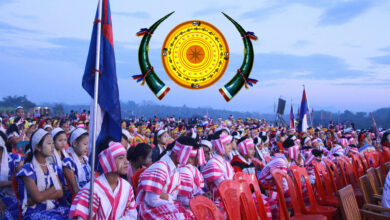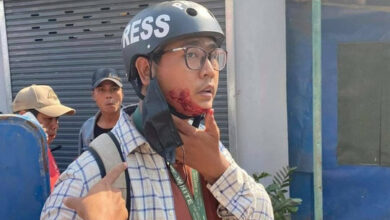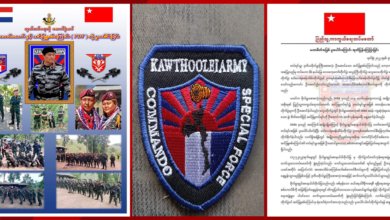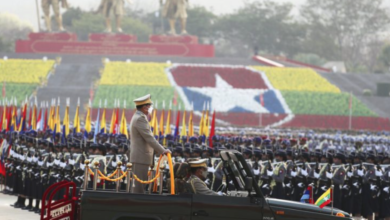Karen Revolution Desperately in Need of a Reality Check
The Karen Revolution is at a stalemate. Before looking to choose which of Saw Ba U Gyi’s three strategies is best for the advancement of the cause, of equal importance is to first reacquaint ourselves with the purpose and foundation of the revolution, and address and remove any and all obstructions within. It is futile to attempt to push forward when direction is lost and the ground on which the revolution stands is not solid or built to endure.
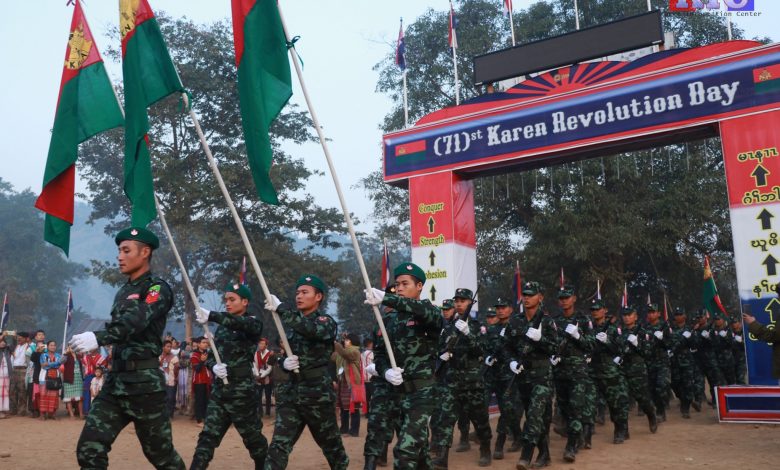
By Laeyudra Greely*
For the past few decades, after the birth of the Karen revolution and its founders’ failure to accomplish its sole purpose of securing the sovereignty of Kawthoolei within their lifetime, there has been little progress, if any at all. With the Karen plight so prolonged to the point where it became the world’s longest ongoing conflict, the momentum of the cause is now fatigued. As with previous generations that experienced the struggle, the current generation faces numerous obstacles. The Karen National Union (?) gets virtually no outside attention nor international support. Its armed wing has fractured into numerous splinter groups each with its own parochial views and desires while those in the political office have attempted to change the meaning of the revolution itself. Furthermore, the chain-of-command of the Karen National Union appears to be loose and there appears there is no centralization of government. The lack of transparency within the gerontocracy of the current administration of the KNU makes it difficult for its official armed wing and those the administration considers to be “outsiders” and “subordinates” to know whether or not there is any intention of effectively dealing with these issues, this in itself is also a critical barrier. The results of these obstructions can be seen through the reality of the predicament the Karen people are in today; such as lack of outside recognition, disunity within the movement, the inability of the Karen National Union to effectively prevent and respond to Burmese military transgressions and adequately protect Karen civilians, and from the overall uncertainty of the future of the Karen people.
At this point of the conflict, ineffectiveness in leadership and the payment of that price through blood of the Karen civilian population has unfortunately become somewhat predictable, and patience among certain youths, especially those who grew up with nationalistic leanings, is beginning to wear thin. As a Karen youth and a fervent believer in Karen nationalism, I have come to observe that the main obstacle of the Karen Revolution is, perhaps, not only the totalitarian regime it seeks to defeat, but also the incompetence within its own ranks, which consequently falls onto the shoulders of the Karen people as a whole. I notice criticism is not taken lightly, however, understand that if we are to preach transparency amongst ourselves and claim our desire for genuine progress for the cause, then overt criticism, even of our own affiliation, is to be expected. This fight is not merely an isolated fight on some distant frontline fought by faceless individuals whose purpose has no bearing on our lives. Rather, it is a fight for the homeland and survival of the entirety of the Karen people, and every moment wasted in this overly long endeavor is detrimental to the Karen people and their way of life. We can no longer afford nor tolerate any incompetence and mediocrity on any level of leadership. The collective Karen population is responsible for any shortcomings of the revolution and it is the responsibility of the Karen people as a whole to acknowledge where there is ineptitude and choose the most qualified individuals to be in positions of leadership before moving forward.
Competence is not the only attribute of being a qualified leader in the Karen Revolution, loyalty to the principles of the cause is the other. It is paramount that every Karen leader understands and remain loyal to the principles of the Karen Revolution to progress in the right direction as there are attempts to distort the words of the founders and corrupt what they had envisioned for Kawthoolei and its people.
According to an excerpt from the series Voices of the Revolution (by Paul Keenan), during the conference held by the second Congress of the KNU in Moulmein on October 3rd and 4th of 1947, the delegates passed two solutions: 1. “That this Karen conference does not accept the constitution of the Union of Burma Government hitherto made because the constitution does not include the granting of a state to the Karens to satisfy their aspirations.” and 2. “To request an independent sovereign Karen State of the following areas…” When Saw Ba U Gyi and other founders of the Karen Revolution mentioned obtainment of the Karen land (including in Saw Ba U Gyi’s famous Four Principles), they used the Karen word for “nation” as in “the Karen nation” and never any other term that would otherwise suggest Karen land to merely be an administrative division within a Burmese union. Ambiguity arises when words or phrases get translated into English, and although the principles of the Karen Revolution remain unequivocally clear to every person who speaks Karen, there remain individuals who use this as an attempt or excuse to water down the goals of the founders. They see the same opportunity in the use of the English phrase “freedom and autonomy”, as this is a common saying and even used in the prompt of this essay. Admittedly, the phrase “freedom and autonomy” is certainly ambiguous. To be autonomous, while there is a degree of self-governance, does not necessarily guarantee complete independence i.e., absolute sovereignty as demanded by the founders of the Karen Revolution. An autonomous state can be and usually is subordinate to a central federal government and those who try to contaminate the spirit and principles of the revolution know this. They use semantics and linguistic trickery as a weapon to confuse their own people and conceal their defeatist sentiments. Thus, before we wish to move forward, those in positions of leadership must acknowledge the sole reason for the Karen Revolution, and that is the desire for a sovereign Karen nation, nothing less. Understand that to seek anything less than full sovereignty for Kawthoolei and its people is to bastardize the principles of Saw Ba U Gyi and the Revolution, and to dispute everything the martyrs laid down their lives for.
Once the objective of the Karen Revolution is made clear again and all ambiguities have been eradicated, then the movement will be able to advance in the direction planned for by the founders. And after its ranks have been refilled with loyal and competent individuals in every position of leadership, then and only then can there be application of any chosen strategy in moving the Karen struggle forward and achieving its goal.
The strategies that will be analyzed are of which Saw Ba U Gyi once laid out for Karen leaders. (Disclaimer: through translation, the meanings of these strategies have slightly been altered, but for the sake of simplicity, no Karen comparison will be made.) The first on the list is armed struggle. It goes without saying that not having the ability to confront the totalitarian Burmese regime with weapons is no different than laying down our necks in Rangoon, or in today’s case, in Naypyidaw. The founders of the Karen Revolution first tried to bargain for independence before resorting to an armed struggle, so they knew this well. At the same time, they knew as well that fighting a war without any political backing is equally suicidal. The second method is political dialogue and a negotiated settlement with the Burmese government. There have been numerous attempts of political dialogues: prior to the outbreak of the conflict, throughout the past seven decades of fighting, and up until this very day, all to no avail. Just from 1989 to 2020, the Burmese government signed at least 35 ceasefire agreements with various ethnic groups, many of those agreements were with the same groups at different times. Each time there is a political dialogue, either the two sides are unable to come to an agreement, or the agreement ends up being repeatedly violated by the Burmese military anyway (look at the so-called Nationwide Ceasefire Agreement signed in 2015). Political dialogue with an opposing party that also happens to be a military dictatorship without the presence of a third party observer is pointless. The final method laid out is international intervention and arrangement on behalf of the Karen people. While this method would seem most suitable given the current circumstances, its chance of success is improbable without the other two.
The strengths of these individual strategies alone do not suffice. Similarly, the weaknesses of these three strategies are not necessarily within themselves, but in lacking the others. Perhaps it is my personal understanding, or perhaps it is something that got misinterpreted, but I doubt the founder of the Karen National Union and the Karen Revolution would want to hinder the success of this Revolution by having all the strategies be mutually exclusive. To analyze the “pros and cons” of these strategies separately and then choose the “best” strategy is restrictive and counterintuitive. No armed struggle in modern history has ever succeeded without some degree of negotiation between the opposing parties and, in today’s climate, a certain degree of third party intervention. Similarly, attempting to achieve the goals and aspirations of the Revolution by having political dialogues with one of the world’s most disreputable offenders of human rights of the past 70 plus years that also happens to be under investigation by the International Criminal Court without the threat of armed confrontation and the presence of an outside arbitrator is nothing more than a pipedream. And lastly, “international intervention and arrangement on the Karen people’s behalf” is subject to the global political climate and nature of the Karen struggle. Due to the globalist inclination of the current political climate, an uninitiated outside party would most likely work with the Burmese government, as the Karen Revolution is intrinsically nationalistic, and also due to the fact that Burma has had a relatively successful history of conning Western countries out of their money behind their mask of “military-backed civilian government.” Furthermore, intervention, to an extent, is no different than an investment. The investor(s) would first have to find something worth investing in. Therefore, however righteous we may believe our cause to be, if there is constant disunity and/or disputes in its objective, then to the international community that has no incentive to support the movement to begin with, it is simply not worth the effort.
Thus, the best strategy forward for the Karen people to achieve their desired freedom and sovereignty is to consolidate the Karen National Union into a centralized and effective organization and then combine and apply all three of Saw Ba U Gyi’s strategies as one. This is achievable only when the Revolution is led by those most competent, devoted, and loyal to its purpose. The revolution must concurrently have a strong military, a solid political backing, and a rigid foundation. As Karen soldiers fight on the frontlines to defend Kawthoolei, the leaders on the political battlefield also must have the capacity to uphold and defend the existence and legitimacy of the Karen Revolution from both the Burmese opposition and the contemporary global political climate (were it to shift against our cause), while the Karen civilian population can support the movement in their own ways, have trust in their leaders and the Revolution once again and have hope in a sovereign Kawthoolei. Once the Karen Revolution is able to stand firmly on its foundation and is led by loyal and competent individuals of conviction, then and only then will it have the respect of the Burmese government on the negotiation table and attention from the international community. That is when the Karen Revolution will break out of the stalemate and truly move forward in achieving the desired freedom and sovereignty. And though it is in my opinion that foreign intervention should be encouraged, but not be too heavily depended upon nor waited on, once the international community sees a unified movement with a clear and undisputed objective, there will be more incentive for intervention in support of the Karen people.
*Laeyudra Greely is an engineering student at the University of Buffalo, New York State. His article was selected as one of the top five essays in KOA’s essay competition to commemorate the 70th anniversary of Karen Martyr’s Day. The essay missed out on a top three position as it failed to fully address the competition’s criteria and guidelines. However, the Karen News editorial board and KOA believes Laeyudra Greely has written an excellent and thought-provoking essay that deserves to be published as an opinion piece.

